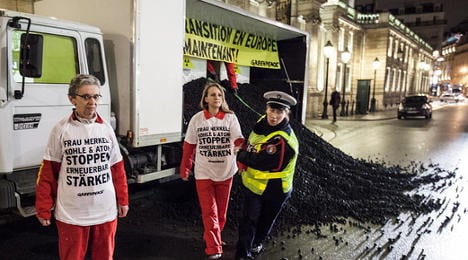Shortly before 7am activists parked a truck outside the presidential palace and dumped five tonnes of coal and two tanks of "radioactive" water into the street.
The action was designed to coincide with the start of the Franco-German Council of Ministries and send a message to both countries about the need to come up with greener energy solutions. Ten activists were arrested by police.
Grenpeace said the two tanks of 2,000 litres of water were contaminated with tritium and taken from in an area in Normandy, northern France.
The group claims the water has been contaminated by leaks from a French nuclear waste depot. A spokesman told The Local the water was in sealed tanks and represented no immediate danger as long as it was not consumed or touched.
The environmental campaigners argue that Germany is too dependent on coal power and likewise France is far too reliant on nuclear energy.
“We want to send a strong message to François Hollande and Angela Merkel. We want them to give up nuclear power and coal, which are dangerous and energies of the past. We want them to go for a real energy transition,” Sebastian Blavier from Greenpeace France told The Local.
“We ask them to commit to using 45 percent renewable energy by 2030 in Europe, because it’s the only way from our perspective to engage a real transition in France, Germany and Europe.”

The German chancellor Merkel is due in Paris along with 18 ministers, who willhold talks with Hollande and 24 of his own ministers in a summit aimed at creating greater cooperation between the two countries.
The main subjects up for discussion are defence, energy transition, foreign affairs and industrial cooperation.



 Please whitelist us to continue reading.
Please whitelist us to continue reading.
Member comments